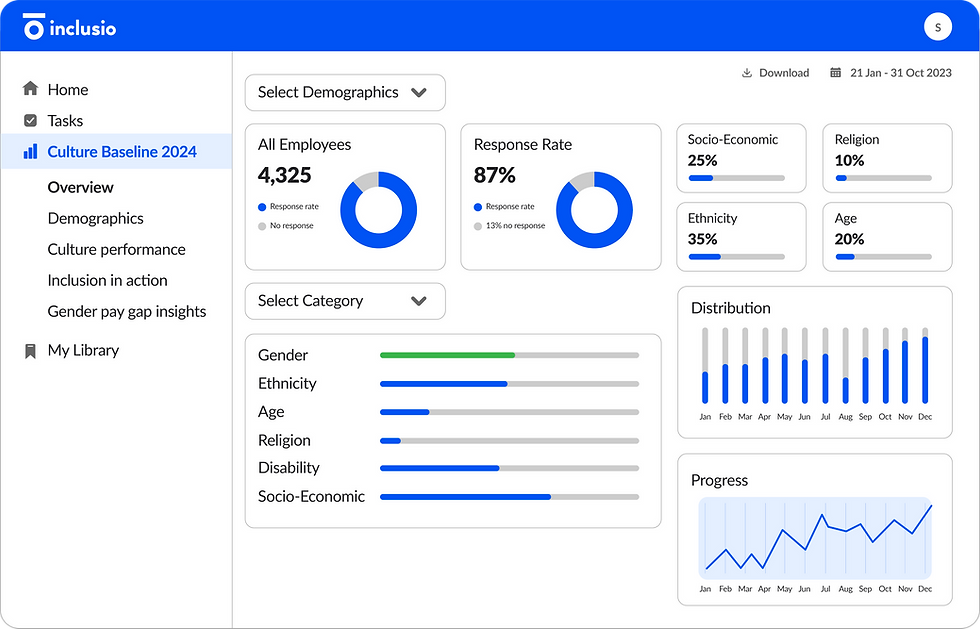Why Organisations Must Take Pay Transparency Seriously
- Sandra Healy
- Jun 9, 2025
- 5 min read
Pay transparency is becoming a strategic priority, driven by rising expectations from regulators, investors, and employees. As focus on fairness and accountability grows, transparent pay practices are increasingly seen as essential to managing risk and building employee trust.
Although the UK is no longer bound to adopt the EU Pay Transparency Directive, the broader momentum behind pay transparency is clearly shaping the UK landscape. Recent signals from government - including the King’s Speech in July 2024 and the ongoing consultation on fair pay practices - point toward potential legislation on salary transparency in job adverts, restrictions on asking for salary history, and stronger rights for workers to request pay comparisons.
Why It Matters for Employers
This shift marks a move away from traditionally opaque pay practices toward a more open and accountable framework. As the UK moves in this direction, employers will need to prepare by auditing pay structures, setting clear and consistent pay criteria, and ensuring managers are equipped to talk confidently and fairly about pay.
inclusio Data Insights

inclusio’s data insights on pay transparency and fairness, representing the voices of over 10,000 employees, reveals a striking disconnect: only one in three people feel they understand how pay decisions are made in their organisation.
🟦 For leaders, this isn’t just a communication failure - it’s a structural risk to talent retention, brand reputation and regulatory compliance.
What inclusio’s Data Reveals about Gender, Pay Gaps, Fairness at Work
inclusio asks employees to provide confidential feedback on what they think and feel about pay transparency, career progression, and gender pay gaps at work. Thousands of responses showed clear trends: people care about fairness, but not everyone feels empowered or informed. Gender plays a big role in shaping those views.
The data reveals not just dissatisfaction, but clear behavioural intentions and disengagement risks if firms don't take action.
Transparency or Opacity?
Existing perceptions around fairness both in the pay system and in contributing talent processes have a profound impact on employee motivation, performance and retention. Leaders need to be prepared to address the implications of increased transparency as inclusio data shows that most organisations are starting at a low base of trust in pay systems and processes.
inclusio Insight 1: Only 1 in 3 Employees Trust the Pay System

Only 1 in 3 feel informed about how pay decisions are made (3.14/5 average rating).
No major gender difference was shown - this is a system-wide transparency failure.
🟦 Most people feel left in the dark about pay transparency - with only 3 out of 5 people (average score: 3.1 out of 5) feeling informed about how pay decisions are made. This is the same across all genders, showing that lack of transparency is a general issue, not just a gendered one.
inclusio Insight 2: Women Feel the Pay Gap More Deeply

89% of women say they'd be concerned if they found a pay gap at work (vs. 79% of men).
🟦 Increased transparency has implications, particularly for women. More women would be concerned if gaps were to come to light when compared to men.
inclusio Insight 3: The Promotion Process is Not Seen as Fair, Particularly by Women

Just 33% of employees feel career progression is fair and equitable.
Men rate fairness slightly higher (3.4 out of 5) than women (3.3 out of 5).
🟦 Leadership Takeaway: Transparency is a trust issue. High-performing women will take decisive action unless they see visible fairness. Talent retention is at stake.
Quiet Quitting or Voting With Their Feet?
Increased transparency may serve to reassure employees and build trust in the psychological contract with their employers. However, if disparities and inequities come to light, inclusio data suggests there are gender differences in how employees are likely to respond.
inclusio Insight 4: 1 in 6 Men Don’t Know How They’d Respond

17.5% of men say they "don’t know" what they’d do if they discovered they were underpaid.
🟦 Men may not speak up. That doesn’t mean they're satisfied. There is a risk men may disengage silently.
inclusio Insight 5: Women Are More Likely to Take Action if Pay Gaps are Identified

64.3% of women said they would raise it with a manager if a pay gap was identified.
24.8% would look for a new job.
🟦 Women are far clearer in the actions they say they will take in this scenario. Managers need to be prepared to address issues as they arise, otherwise data suggests a quarter of women are prepared to take their talents elsewhere.
inclusio Insight 6: Non-Binary Employees Are Most at Risk of Disengagement

1 in 3 people of other gender identities (30%) would leave if they felt underpaid.
Only 56% said they would speak up.
14.8% say they’d do nothing if underpaid (nearly double the male average).
🟦 Leadership Takeaway: A one-size-fits-all approach to pay transparency doesn’t work. Managers need to be trained to identify and address concerns around fairness and potential disengagement.
What This Means for Employers
Increased transparency may serve to reassure employees and build trust in the psychological contract with their employers. However, if disparities and inequities come to light, inclusio data suggests there are gender differences in how employees are likely to respond.
inclusio’s insights highlight the direction companies need to move in to mitigate potential talent risks:
🟦 Be more transparent about pay and promotion decisions
Most people feel left out of the loop. Clearly communicate how compensation is determined and provide visibility into promotion and bonus criteria.
🟦 Help employees understand their rights and options
Most people don’t know what they would do if they saw a pay gap. Provide workshops or training, especially for men on how to identify and address pay inequity. Normalize conversations around pay with HR and your people managers.
🟦 Build Inclusive Support Structures - support all genders equally
Non-binary employees are the least likely to speak up and the most likely to leave. Ensure non-binary and underrepresented gender identities feel heard and safe escalating concerns. Include intersectional lenses (e.g., gender + race) in future analyses.
🟦 Close the perception gap in career fairness
Women consistently feel they have fewer opportunities than men. Monitor and Address Career Progression Gaps with special attention to promotion rates and feedback loops to ensure equity in advancement opportunities.
Practical actions being taken by leading companies include:

1: Publishing internal and external pay equity audit results
2: Disclosing salary ranges in job ads
3: Equipping managers to talk confidently about pay
4: Setting measurable KPIs on progression fairness
5: Listening to the voices of their employees
Ready to Measure What Matters?
inclusio helps organisations take tangible measures of workplace culture by turning abstract concepts like trust, belonging, and psychological safety into clear, actionable insights. By capturing the voice of employees, it reveals cultural strengths and gaps across teams and demographics. This data-driven approach enables leaders to benchmark progress, set meaningful inclusion goals, and drive lasting change.
Talk to our expert team to learn how inclusio’s Scientific Culture Model™ drives lasting change - because when culture is measurable, change becomes possible.
References
inclusio (2025) Aggregated Perception Data: Pay transparency and Fairness. Global dataset, collected via confidential employee self-reporting on the inclusio platform.
Authors: Sandra Healy | Hima Vaghani, June 2025
Copyright © 2025 inclusio. All rights reserved.


Невозможно представить наше настоящее без качественного и проверенного новостного портала, который предоставляет всю необходимую информацию своим читателям. В свое время, я потратил большое количество нервов, чтобы наконец найти соответствующий информационный портал. Сейчас, благодаря безупречной работе Delo.ua, я узнаю обо всех новостях https://delo.ua/ru/news/, которые меня интересуют, их особенность в том, что они делают большой упор на бизнес новостях, что очень круто. Читая их статьи, я гораздо лучше понимаю, что именно происходит в моей стране потому, что именно они публикуют все важные инсайды, которые в дальнейшем влияют на понимание ситуации. Плюс, ко всему этому, еще добавляется их работа с иностранными материалами, они очень круто обрабатывают все те новости, что есть за рубежом, это добавляет очень важных материалов. С помощью новостного портала Delo.ua,…